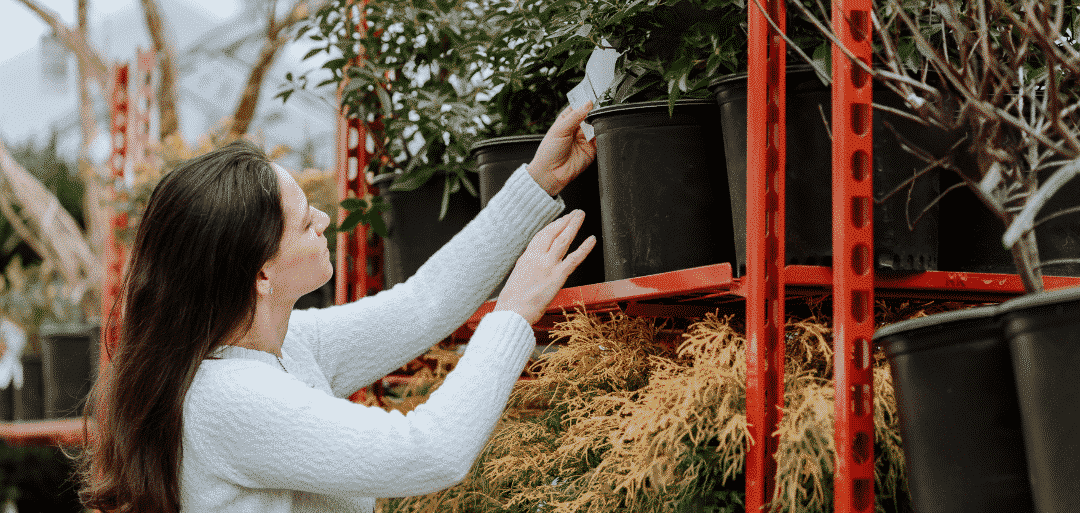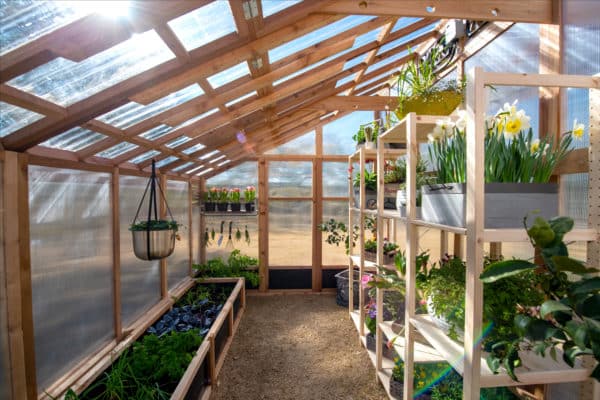
One of the most exciting parts of beginning your backyard farming journey is the ability to select and grow what you love! As you begin the search for plants to occupy your raised garden beds or Slant-Roof Greenhouse™ your search may begin at your local big box store garden center, local nursery, or even online. But does it truly matter where you buy your plants?
Although you are guaranteed to find great finds at all these locations, the biggest factor separating each comes down to plant quality and at times price. Although it may seem simple to buy a plant solely based on its growth at the time of purchase, there are a number of determinants beyond the leaves and petals that will determine how your new garden addition grows. To help we share 3 key differences between buying plants locally, both from small and large-scale locations. We hope that by the end of this quick article you’ll feel more confident and well-aware of how choosing where to buy your plants can make a great deal of a difference in your gardening goals from the start.

Soil:
One of the largest factors separating each plant seller will come down to the soil used. Perlite, an organic white crumbled rock used to aerate most soil mixtures is common in all plants stores. However, although easy to spot in plants, there are artificial perlite alternatives, such as styrofoam, commonly being used. One way to easily check is by trying to crumble the perlite between your fingers. Styrofoam, although cheaper, doesn’t break down and will often make it easier to waterlog your potted plants.
Oftentimes our intention for backyard farming is to produce homegrown organic veggies and fruits. However, without intention, we may still be handling pesticides found in our soil choice or seeds. Neonicotinoids, a widely used pesticide that is known to be toxic to bees, may commonly be found in potting soil. When found on seeds, this pesticide works its way to the pollen of your flowering plants. The use of Neonicotinoids is often disclosed on plants and potting soils.
Sourcing:
Often with big box stores, plants are sourced from large-scale growers around the country before being shipped near you. When purchased in bulk, the savings are often passed down to you at a lower cost. As is the case with many large operations, efficiency is top of mind, and with that comes some lack of care in the form of lower grade soil mixtures that are best replaced immediately. Once replaced it will often take time for your plants to acclimate to their new soil conditions. Plants sourced from afar tend to be less cared for during their expedition, often resulting in hidden root damage.
When buying locally, you may find that prices range higher, however, the quality you receive will far exceed your expectations. Local nurseries will oftentimes already have ideal soil mixed plants that will eliminate the need for immediate repotting. In addition, your plants will be well adjusted to your environment as opposed to those that may have been grown and shipped over various state lines from locations whose climate varies greatly from yours.
Service:
For small independent nurseries and plant shop owners, plant care is an enjoyable and loved experience. Owners and employers are more likely to better care for plants to their preferred conditions. Additionally, they’ll have extensive knowledge to share to further assist you in reaching your gardening goals and needs. Additionally, plants are tended to accordingly to maximize lifetime and growth by small nurseries.
At big-brand stores, employees routinely water hundreds of plants, often without awareness of the best methods for long-term plant health. Hence, plant turnovers are also more common and quick in large stores. Oftentimes it’s also difficult to find genuine plant care recommendations if you are a beginner.
Interested in reading more about gardening? We recommend checking out the article “How to Prepare your Greenhouse for Fall“.
As you begin or continue your backyard farming journey, adding new plant additions is an activity that is bound to happen often. Whether you choose to shop small or big, it’s important to note that the success of your plant will always begin with a great quality find. We hope you found this quick and informative blog by us helpful as you continue your backyard farming journey. Have questions or comments about starting your garden? Please feel free to email us at support@roostandroot.com or give us a call at 877-741-2667.


